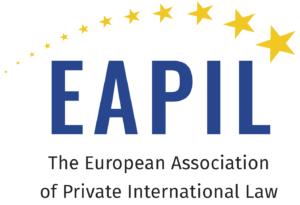Views
Nothing Found
Sorry, no posts matched your criteria
News
EAPIL founding conference 2022 in Aarhus
Written by Christian Rüsing, University of Münster
 From 2 to 4 June 2022, the founding conference of the European Association of Private International Law (EAPIL) took place in Aarhus. After the idea of founding the association had emerged at a conference in 2018 and its incorporation in 2019, it offered an opportunity to discuss fundamental issues of private international law in Europe with about 150 participants.
From 2 to 4 June 2022, the founding conference of the European Association of Private International Law (EAPIL) took place in Aarhus. After the idea of founding the association had emerged at a conference in 2018 and its incorporation in 2019, it offered an opportunity to discuss fundamental issues of private international law in Europe with about 150 participants.
In his keynote speech at the kick-off event on Thursday, Peter Arnt Nielsen (Copenhagen Business School) outlined the development of the institutional framework and its significance for European conflict of laws. Andreas Stein (European Commission) addressed current legislative projects in his report from Brussels. Particularly, he highlighted the recently published Directive proposal on “Strategic lawsuits against public participation” (SLAPPs). Subsequently, drawing inspiration from AG Maciej Szpunar’s report from Luxembourg on current fundamental rights issues in private international law, the conference especially discussed the significance of the EU Charter of Fundamental Rights with great enthusiasm, including SLAPPs and the recognition of foreign judgments.
On Friday morning, the presentations and discussions concentrated on digitalisation, with particular attention to platforms, blockchains, the transfer of digital assets and the digital resolution of cross-border disputes. Several speakers and participants addressed the challenging question of the extent to which new technologies require special treatment in private (international) law. In the afternoon, the focus was on the phenomenon of fragmentation in European private international law, which led to a lively debate on the need for a coherent general instrument or codification of EU conflict of laws. After the speakers had expressed themselves rather neutrally or even partly positively on the phenomenon, several participants in the discussion spoke rather in favour of stronger coordination.
The questions of fragmentation and need for reforms also arose on Saturday, when issues of international family law, succession law and property law were dealt with. Now, however, it was more a question of concrete issues of demarcation, such as those that can arise between matrimonial property law and property law. With regard to international family law, the role of religious laws in private international law and parental responsibility in cross-border cases was discussed as well.
 At the general assembly, the association’s past and future activities and participation opportunities for members in seminars, working groups and a Young Researchers Network were presented. The Secretary General, Giesela Rühl (Humboldt-University of Berlin), was happy to announce that the association already had 389 members from 63 countries. Since practitioners can also become members, the association fosters the exchange between science and practice, which was clearly seen at the conference in several contributions to the discussion on the user-friendliness of European legal acts. Further information on the EAPIL can be found here.
At the general assembly, the association’s past and future activities and participation opportunities for members in seminars, working groups and a Young Researchers Network were presented. The Secretary General, Giesela Rühl (Humboldt-University of Berlin), was happy to announce that the association already had 389 members from 63 countries. Since practitioners can also become members, the association fosters the exchange between science and practice, which was clearly seen at the conference in several contributions to the discussion on the user-friendliness of European legal acts. Further information on the EAPIL can be found here.
All in all, the conference offered – also thanks to the organisation by Morten M. Fogt (University of Aarhus) and his team – an excellent opportunity for academic exchange, which so many participants missed in recent years. The full program of the conference and an overview of the speakers are available here.
First Issue of Journal of Private International Law for 2022
The first issue of the Journal of Private International law for 2022 was released yesterday. It features the following articles:
For the first time, the CJEU has ruled in VEB v BP on the court competent for deciding liability suits regarding misinformation on the secondary securities market. Surprisingly, the Court localises the damage resulting from misinformation on the secondary financial markets at a single place, that where the financial instruments in question were listed. This raises the question of how the decision can be squared with earlier cases like Kolassa or Löber and other precedent. It is also unclear how the new ruling applies to special cases like dual listings or electronic trading venues. Furthermore, the judgment is of utmost importance for the jurisdiction over collective actions by postulating that they should not be treated any differently than individual actions, without clarifying what this means in practice. This contribution analyses these questions, puts the judgment in larger context, and discusses its repercussions for future cases.
F Rielaender, “Financial torts and EU private international law: will the search for the place of “financial damage” ever come to an end?”
Update: 4th International Class Action Conference, Amsterdam, 30 June to 1 July 2022
Update from the organizers:
“Thanks to the generosity of our sponsors we are able to offer a limited number of participants a partial waiver of the conference. If you work in the not-for-profit sector (academia, ngo’s, judiciary or other government institutions) you can contact the conference bureau (conference@uva.nl) to check for eligibility. The reduced fee will be the same as the one for students and PhD fellows.”
For all those interested in the various aspects of collective redress, including cross border issues (in securities and competition cases), the 4th International Class Action Conference held as an on-site conference in Amsterdam provides an excellent opportunity to discuss current issues and share your own experiences. The international conference is co-organized, inter alia, by the University of Amsterdam (The Netherlands), University of Haifa (Israel) and Tilburg University (The Netherlands) and described as follows:
”
4th International
Class Action Conference
Amsterdam, 30 June – 1 July 2022
On 30 June and 1 July 2022 the University of Amsterdam will host the 4th international class action conference. The conference is organized by a team from the University of Haifa, the University of Tilburg and the University of Amsterdam, in collaboration with several renowned institutions. The theme of this year’s conference is ‘From Class Actions to Collective Redress: Access to Justice in the 21st century’.
The Conference will bring together a diverse range of international expertise in collective redress. The conference is intended to act as a forum for the sharing of experiences and knowledge. In an increasingly interconnected world, such opportunities for international scholars and practitioners to come together and compare notes on the development of collective redress in their jurisdictions, are more relevant than ever.
For details on the programme and a full list of collaborators, please see 4th International Class Action Conference – Home (aanmelder.nl).”
There are different registration fees for commercial participants (500 EUR) and academics/judges/NGOs (300 EUR) as well as a reduced charge for (PhD) students (75 EUR).


